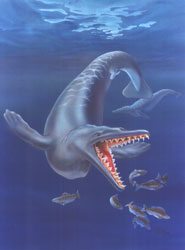Felix studied the quality of the fossil record of whales as part of his third year project. The work was so original and revealing that he was encouraged to publish it.
The new work is part of a debate about the quality of the fossil record. For example, when rocks are exposed, lots of fossils are found, but where rock of a certain period is missing, fossils appear to be absent in the record. Palaeontologists seek to correct for this ‘rock bias’ before carrying out evolutionary studies.
Felix looked at the fossil record of whales, seals and sea cows over the past 60 million years in Europe. In order to do this, he studied geological maps of Europe covering this time and measured the relative areas of rocks of different ages. He then compared these figures with the numbers of species of each marine mammal group.
“Previously it was thought that most of the changes in the number of species could be explained by geological bias,” says Felix, “but my results show that at least some of the changes were caused by genuine reactions of these animals to changes in their biological or physical environments. This was rather unexpected.”
Professor Michael Benton, head of the programme, commented: “Students carry out a quantitative study as part of their training, but they do not normally publish the results. Felix is enthusiastic about fossil whales and other marine mammals and he did some work that has real originality.”
The new findings also mean that the hunt is now on to discover the environmental factors driving the evolution of marine mammal. One of the things that may help understand this was an observation made by Felix that the number of whale and seal species rose and fell almost at the same time, whereas that of sea cows seemed to follow a rather different pattern. These differences may actually reflect their rather different ecological strategies.
“Many whale and seal species are quite similar in a number of ways. They are found all around the world in both the open ocean and close to the coast, they are predators and many of them migrate. By contrast, sea cows are usually plant eaters, prefer shallower waters and are usually found in the tropics,” explains Felix.
More research is necessary to find out whether this idea is correct and, if so, exactly which environmental factors drove these three groups along their different evolutionary paths. Felix is optimistic: “It will take a while to do this, but I have some ideas”.
“The joint Geology-Biology programmes at Bristol have a strong reputation for attracting exceptional students,” says Professor Benton, “and we are keen to encourage them to excel in this way and make their mark at an international level.”
Felix’s paper, ‘Marine mammals through time - when less is more in studying palaeodiversity’ is published today (19 November) in Proceedings of the Royal Society, Series B.

